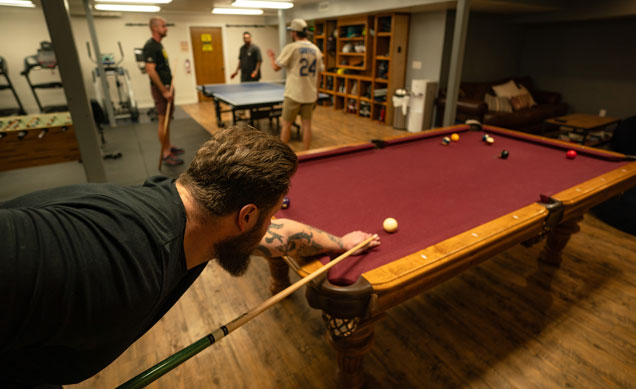Residential treatment helps people focus fully on recovery in a safe, supportive place. It removes daily stress, distractions, and access to drugs or alcohol. For many men, these residential treatment benefits make recovery feel possible for the first time.
In residential care, clients live at the treatment center. Each day follows a clear routine built around therapy, support, and healthy habits. This structure helps people stay focused and build real momentum early in recovery, especially during the most vulnerable early stages.
This guide explains the benefits of residential treatment in clear, simple language. It also covers who this level of care helps most, how it compares to outpatient treatment, and why inpatient care often leads to stronger long-term results.
What Is Residential Treatment?
Residential treatment, also known as inpatient rehab, is a live-in treatment program for addiction and mental health concerns. Clients stay at the treatment center full-time while receiving therapy, medical oversight, and emotional support groups.
Unlike outpatient programs, residential treatment removes people from environments that may fuel substance use disorders. This separation gives the brain and body time to stabilize. It also allows individuals to focus on healing without daily pressures like work, social stress, or access to substances.
Most residential programs include individual therapy, group therapy, mental health support, and relapse prevention planning. Many also offer trauma-informed care, behavioral therapy, and skills training. The goal is not only sobriety, but stability, self-awareness, and confidence for life after treatment.
Why Residential Treatment Is Often More Effective
Addiction changes how the brain handles stress, emotion, and decision-making. Early recovery can feel overwhelming without structure and support. Residential treatment works because it creates a calm, predictable environment where healing can begin.
Living onsite helps people slow down. It reduces impulsive choices and replaces chaos with routine. Over time, this steady rhythm helps the nervous system reset and supports emotional balance.
The Key Benefits of Residential Treatment
1. A Safe, Structured Environment
One of the biggest advantages of residential treatment is safety. Living onsite removes access to drugs and alcohol and limits exposure to triggers.
Each day follows a clear schedule. Therapy, meals, rest, and activities happen at set times. This structure helps people build healthy habits and reduces stress caused by uncertainty.
2. Support Available at All Times
Round-the-clock care is one of the most important inpatient treatment benefits. When cravings, anxiety, or emotional distress appear, help is available right away.
Immediate support can prevent small struggles from turning into setbacks. This is especially important for people dealing with panic, depression, or mood swings.
3. More Time in Therapy
Residential programs offer more therapy than outpatient care. Clients attend individual sessions, group therapy, and educational groups throughout the week.
These inpatient rehab benefits allow people to explore deeper issues like trauma, grief, stress, or long-standing coping patterns. Addressing these issues early supports lasting recovery.
4. Mental Health and Addiction Treated Together
Many people entering treatment struggle with both addiction and mental health challenges. Residential programs treat both at the same time.
This approach helps people understand how mental health and substance use affect each other. Treating both together reduces relapse risk and improves emotional stability.
5. Fewer Triggers and Distractions
Early recovery is fragile. Returning home each night can expose people to stress, conflict, or familiar routines tied to substance use.
Residential treatment creates distance from these triggers. This protected space gives people time to practice coping skills before returning to daily life.
6. Peer Support and Connection
Recovery can feel isolating. Living with others who understand the struggle creates connection and accountability.
Group therapy and shared experiences help people feel less alone. For many men, this sense of belonging becomes a powerful source of motivation.
7. Personalized Treatment Plans
No two recovery journeys are the same. Residential programs adjust care based on progress, mental health needs, and personal history.
This flexibility helps people stay engaged and ensures treatment matches their needs instead of following a rigid formula.
8. Life Skills and Relapse Prevention
Residential care focuses on preparing people for life after treatment. Clients learn how to manage stress, communicate clearly, and respond to cravings.
Relapse prevention planning helps people recognize warning signs and respond early. These skills are critical once structure decreases.
9. Focus on Long-Term Recovery
Residential treatment is not just about getting sober. It helps people rebuild routines, values, and self-trust.
This long-term focus explains why residential treatment works for individuals who have struggled in the past or experienced repeated relapses.
10. Higher Completion Rates
Because clients live onsite and receive steady support, inpatient programs often have higher completion rates than outpatient care.
Staying in treatment longer increases the chance of meaningful change and long-term success.
Why Residential Treatment Works
The advantages of residential rehab go beyond removing substances. This level of care helps people stabilize, rebuild confidence, and learn how to live without relying on drugs or alcohol.
For men who want real, lasting change, residential treatment provides a strong foundation for long-term recovery.
Residential Treatment vs Outpatient Care
Outpatient treatment allows people to live at home while attending therapy sessions. This option can work for mild addiction and strong support systems.
Residential treatment is often a better fit for people who:
- Have moderate to severe addiction
- Live in unstable or triggering environments
- Have mental health conditions
- Have experienced relapse before
Understanding residential treatment benefits compared to outpatient care helps families choose the right level of support.
Who Benefits Most From Residential Treatment?
Residential care is helpful for people who need time, space, and structure to reset. It is especially effective for individuals who have not succeeded in less intensive programs.
Men dealing with trauma, chronic stress, or emotional regulation issues often experience strong growth in residential treatment. The immersive environment allows deeper healing to take place.
What Sets Jaywalker Apart

At Jaywalker, we’re committed to providing long-term recovery support for men. Our approach is an integration of evidence-based treatments, peer support, and aftercare planning. We understand the unique challenges men face and personalize each treatment plan to address them where they are.
Residential treatment is not just a program—but rather the chance to establish a new way of life. And for many men, it’s the breakthrough they’ve been looking for.
If you are ready to take the first step, contact Jaywalker today. Discover how our residential treatment center center can help you through your road to recovery from addiction.
FAQs About Residential Treatment
Is residential treatment worth it?
How long do the benefits of residential treatment last?
Does insurance cover residential treatment?
Does residential treatment help prevent relapse?
Is residential treatment effective for mental health conditions?
Related Blogs on Residential Treatment



